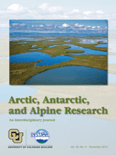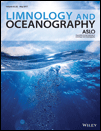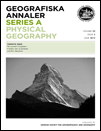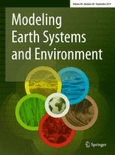
ARCTIC ANTARCTIC AND ALPINE RESEARCH
Scope & Guideline
Illuminating the Dynamics of Earth’s Coldest Frontiers
Introduction
Aims and Scopes
- Climate Change and Environmental Impact Studies:
The journal consistently addresses the effects of climate change on polar and alpine ecosystems, exploring how rising temperatures and changing precipitation patterns influence biotic and abiotic factors. - Permafrost and Cryospheric Research:
A significant focus is on the study of permafrost dynamics, including its thermal state, carbon emissions, and ecological implications, which are crucial for understanding broader climate processes. - Biodiversity and Ecosystem Dynamics:
Research on species distribution, community dynamics, and the impact of environmental changes on flora and fauna is a core area, highlighting the importance of biodiversity in these sensitive regions. - Geospatial and Remote Sensing Applications:
The journal emphasizes the use of advanced geospatial technologies and remote sensing to monitor environmental changes, track glacial movements, and assess ecological impacts. - Hydrology and Water Resources:
Topics related to hydrological changes, water quality, and the effects of climate change on freshwater systems in polar and alpine regions are frequently explored. - Ecological Interactions and Adaptations:
Research investigating the interactions among species, including plant-animal dynamics and microbial processes, is prevalent, showcasing how organisms adapt to extreme environments.
Trending and Emerging
- Impact of Climate Change on Biodiversity:
There is an increasing focus on how climate change affects species distribution and community dynamics, particularly concerning vulnerable species and ecosystems in the Arctic and alpine regions. - Permafrost Thaw and Carbon Release:
Research into the implications of permafrost thaw, including the release of greenhouse gases and its feedback effects on climate, is gaining traction and is crucial for understanding future climate scenarios. - Human Dimensions and Socioecological Systems:
Emerging studies are integrating human dimensions into ecological research, exploring how communities adapt to environmental changes and the implications for management and policy. - Microbial Ecology and Ecosystem Functioning:
There is a growing interest in the role of microbial communities in ecosystem processes, particularly in the context of changing climates and their influence on nutrient cycling. - Technological Innovations in Environmental Monitoring:
The application of new technologies, such as drone-based surveys and advanced modeling techniques, is increasingly featured in research, enhancing the capacity to monitor and respond to environmental changes.
Declining or Waning
- Historical Climate Reconstructions:
There has been a noticeable reduction in papers focused on historical climate reconstructions using paleoclimate data, suggesting a shift towards contemporary studies and immediate climate impacts. - Glaciology and Glacier Dynamics:
Although still relevant, traditional glaciology topics may be declining in favor of studies focusing on the impacts of glacial retreat and meltwater on ecosystems and hydrology. - Traditional Ecological Studies:
Research that primarily focuses on static ecological assessments without integrating climate change implications has become less common, reflecting a trend towards more dynamic and adaptive ecological studies.
Similar Journals

Earth Interactions
Bridging Disciplines to Decode Earth’s ComplexitiesEarth Interactions is a prominent journal that serves as a critical platform for interdisciplinary research in the field of Earth and Planetary Sciences. Published by the American Meteorological Society, this journal has established itself as a key resource for scholars, researchers, and professionals dedicated to understanding Earth's complex systems and their interactions. With an impressive Q1 ranking in the category of Earth and Planetary Sciences for 2023, it reflects a commitment to high-quality scholarship and impactful contributions to the field. The journal, with its dedicated coverage from 2004 to 2024, encompasses a wide array of topics, providing comprehensive insights into geological, atmospheric, and environmental phenomena. Although it operates under a non-open access model, its significance is underscored by its placement in the top percentile of Scopus rankings (Rank #89/195), making it an exciting resource for those pursuing advanced studies and applications related to Earth's systems.

Nature Conservation Research
Leading the charge in ecological and environmental research.Nature Conservation Research is a prominent open-access journal that has been dedicated to advancing the field of conservation science since its inception in 2016. Published by the SARANSK FOND PODDERZKI & RAZVITIA ZAPOVEDNYH in the Russian Federation, this journal serves as a vital platform for researchers, professionals, and students alike, providing critical insights into ecological and environmental issues. With an impressive impact factor and ranked in the second quartile across multiple categories—including Agricultural and Biological Sciences, Earth and Planetary Sciences, Ecology, and Nature and Landscape Conservation—Nature Conservation Research stands at the forefront of impactful scientific discourse. The journal not only aims to disseminate high-quality research findings but also seeks to foster collaboration and innovation in conservation practices globally. By ensuring open access to its content, it promotes widespread dissemination of knowledge, crucial in the fight against biodiversity loss and environmental degradation. Researchers and practitioners contributing to the journal will find themselves at the convergence of science and conservation efforts, paving the way for sustainable ecosystem management.

Journal of Oceanology and Limnology
Bridging Disciplines for a Healthier PlanetJournal of Oceanology and Limnology, published by SCIENCE PRESS, is a premier academic journal dedicated to advancing the fields of oceanography and limnology. With an ISSN of 2096-5508 and E-ISSN 2523-3521, this journal has emerged as a vital resource since its inception, aiming to disseminate cutting-edge research and comprehensive studies on aquatic environments. Based in China and indexed with notable rankings in Scopus, including a Q2 category in Oceanography and a Q3 category in Water Science and Technology, this journal significantly contributes to knowledge in these crucial scientific disciplines. The H-index for the journal is currently being established, reflecting its evolving impact within the academic community. Moreover, the open access model promotes wider dissemination, ensuring that research findings are accessible to a global audience. Covering a diverse range of topics from ecosystem health to climate impact on water bodies, the Journal of Oceanology and Limnology aspires to foster interdisciplinary dialogue and innovation among researchers, professionals, and students engaged in understanding and preserving aquatic life.

LIMNOLOGY AND OCEANOGRAPHY
Empowering Scholars to Influence Policy and ConservationLimnology and Oceanography is a premier peer-reviewed journal published by Wiley that has been at the forefront of aquatic sciences since its inception in 1956. With an impressive impact factor placing it in Q1 in both Aquatic Science and Oceanography categories, this journal showcases cutting-edge research and studies relevant to the dynamics of freshwater and marine ecosystems. Limnology and Oceanography serves as a vital platform for researchers, professionals, and students to disseminate their findings and foster a deeper understanding of aquatic environments. The journal does not currently offer open access, but it provides a unique opportunity for scholars to contribute to a body of work that influences policy, conservation efforts, and the scientific community at large. With its substantial ranking in Scopus as #12 in Aquatic Science and #9 in Oceanography, Limnology and Oceanography remains a critical resource for advancing knowledge in these vital fields.

Geography and Natural Resources
Advancing Knowledge in Natural Resource ManagementGeography and Natural Resources is a vital academic journal published by MAIK NAUKA/INTERPERIODICA/SPRINGER, focusing on diverse aspects of geography, natural resource management, and environmental sciences. With its ISSN 1875-3728 and E-ISSN 1875-371X, the journal serves as a platform for scholars and researchers to disseminate their findings in a rapidly evolving field. The journal holds a respectable Q3 ranking in the categories of Earth-Surface Processes and Geography, Planning and Development, as well as a Q4 ranking in Management, Monitoring, Policy, and Law, reflecting its commitment to quality research. Although it is not an open-access journal, it offers valuable insights and impactful articles tailored for professionals and academics interested in the intersection of human and environmental systems. By bridging theoretical and practical applications, Geography and Natural Resources plays a crucial role in guiding policies and enhancing understanding of sustainable development from 2008 to 2024 and beyond, making it an indispensable resource for the global scholarly community.

Quaestiones Geographicae
Exploring the Boundaries of Geographical KnowledgeQuaestiones Geographicae, an esteemed open-access journal published by SCIENDO, serves as a vital platform for scholarly communication in the field of Earth and Planetary Sciences. Since its inception in 1979, the journal has been dedicated to promoting rigorous research and discourse in geography, encompassing a breadth of topics that reflect the dynamic nature of the discipline. With an impressive Impact Factor belonging to the Q3 quartile category, the journal actively contributes to the global scientific community's understanding of geographical phenomena. Its commitment to open-access publishing since 2010 ensures that groundbreaking research is accessible to a wider audience, facilitating collaboration and innovation. As part of its enduring legacy, Quaestiones Geographicae engages researchers, professionals, and students alike, inviting them to explore, share, and expand the boundaries of geographical knowledge.

GEOGRAFISKA ANNALER SERIES A-PHYSICAL GEOGRAPHY
Navigating the Terrain of Earth SciencesGeografiska Annaler Series A-Physical Geography, published by Taylor & Francis Ltd, is a leading academic journal dedicated to the advancing field of physical geography. With a rich publication history spanning from 1979 to 2024, this journal stands out in its categories, being positioned in the Q2 quartile for both Geography, Planning and Development and Geology in 2023. The journal is recognized for its contribution to Earth and Planetary Sciences, evidenced by its Scopus rankings placing it in the top 31% and 32% of its respective disciplines. Belonging to a distinguished publisher from the United Kingdom, it provides a vital platform for researchers, professionals, and students to disseminate and engage with cutting-edge research. While the journal does not currently offer open access, it remains a pivotal resource for those involved in the study of physical geography, offering insights that enhance our understanding of the Earth's processes and environments.

Alpine Botany
Fostering Interdisciplinary Insights into Alpine Environments.Alpine Botany is a premier scholarly journal published by SPRINGER BASEL AG, dedicated to the field of ecological and botanical research with a specific focus on alpine environments. With an ISSN of 1664-2201 and an E-ISSN of 1664-221X, this journal has established itself as a significant platform for disseminating high-quality research findings, with its latest category rankings placing it in the Q1 quartile for both Ecology, Evolution, Behavior and Systematics as well as Plant Science. Originating from Switzerland, Alpine Botany benefits from its geographical context, fostering a rich exchange of ideas and research advancements relevant to high-altitude flora. The journal operates under an Open Access model, promoting widespread accessibility of its content while accommodating an increasing demand for interdisciplinary studies within the ecological and botanical communities. With a commitment to excellence, Alpine Botany continues to serve as an invaluable resource for researchers, professionals, and students who are keen to explore and understand the complexities of alpine ecosystems.

Modeling Earth Systems and Environment
Bridging theory and application for a sustainable future.Modeling Earth Systems and Environment is a premier interdisciplinary journal published by Springer Heidelberg, dedicated to advancing the understanding and modeling of Earth's systems and environmental processes. Since its inception in 2015, this journal has established itself as a vital resource within the academic community, attaining a Q1 ranking in Agricultural and Biological Sciences and Q2 rankings in Computers in Earth Sciences, Environmental Science, and Statistics, reflecting its high impact and relevance across multiple disciplines. Featuring rigorous peer-reviewed research, Modeling Earth Systems and Environment aims to bridge the gap between theory and practical application, fostering collaboration among researchers, professionals, and students alike. With access options that prioritize the dissemination of knowledge, this journal is crucial for those seeking to contribute to the fields of environmental modeling and systems science, encouraging innovations that address contemporary environmental challenges.

Earth Systems and Environment
Transforming Insights into Action for Earth’s Well-beingEarth Systems and Environment, published by Springer International Publishing AG, is a leading peer-reviewed journal dedicated to the multidisciplinary study of natural and anthropogenic processes that shape the Earth's systems. With an impressive impact factor and consistently ranked in the Q1 category across various fields, including Computers in Earth Sciences, Economic Geology, and Environmental Science, it stands as a premier platform for researchers and professionals seeking to address pressing environmental challenges. The journal covers a wide spectrum of topics, from geology to global change, and emphasizes innovative methodologies and interdisciplinary approaches to understand and manage Earth systems. As an essential resource for scholars and practitioners, Earth Systems and Environment commits to excellence and facilitates open dialogue on critical issues affecting our planet.